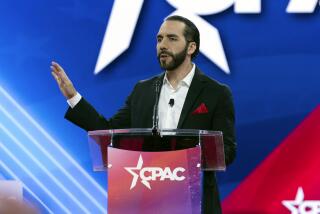Rubio appeals to Latinos on Romney’s behalf
CHESTER TOWNSHIP, Pa. — Marco Rubio took the stage with Mitt Romney and delivered what the presidential candidate wanted — a jolt of energy aimed at an uninspired Republican base and a message of inclusion to Latino voters, who have drifted away from the party in droves.
Monday’s appearance by Rubio, a Florida senator and possible vice presidential pick who has become one of his party’s most prominent Latino leaders, drew cheers and applause from the crowd. But it was also a reminder of competing imperatives facing Romney after a combative primary season in which he moved far to the right on illegal immigration, a key concern for many Latino voters.
For months, Romney repeatedly sought to outflank his opponents on the issue: chiding Texas Gov. Rick Perry for favoring in-state tuition breaks for the children of illegal immigrants, vowing to veto the Dream Act that would have allowed citizenship for certain students who joined the military or attended college, and suggesting that Arizona’s controversial approach to rooting out illegal immigrants could be “a model” for the nation.
Rubio, a conservative darling, has carved a more moderate path — most recently working on an alternative to the Dream Act.
The senator’s proposal, which is still being devised, would legalize the status of certain young people if they pursued higher education or went into the military, but would probably not provide them a guaranteed route to citizenship. Although the Rubio proposal would offer them a visa, they would have to wait their turn behind legal immigrants for citizenship.
Underscoring the political perils of the issue, Romney was cautious when asked his position on the proposal during a Monday news conference at a trucking company in Chester Township. He said he and Rubio had discussed the Florida senator’s “thinking” on the measure but made it clear he was not yet ready to sign on.
One of Romney’s objections to the original Dream Act was that it would have created “a new category of citizenship for certain individuals.” By contrast, Rubio’s concept, he said, “does not create that new category but instead provides visas for those that come into the country as young people with their families.”
“I’m taking a look at his proposal,” he said. “It has many features to commend it, but it’s something that we’re studying.”
Romney has said in the past that he would be open to the possibility of legislation that creates a path to citizenship for illegal immigrants who serve in the military, but on Monday he would not say whether any other group deserved special status.
He said that before the November election he would lay out “a whole series of policies” on immigration, adding that “how we adjust our visa program to make it fit the needs of our country is something I’ll be speaking about down the road. But I don’t have anything for you on that at this stage.”
Romney faces complicated terrain as he tries to consolidate his party’s conservative base, which has been cool to him throughout the primaries, while also broadening his appeal to Latinos, a constituency that will be key to determining the next occupant of the White House.
Embracing Rubio’s legislation could alienate some conservatives — who must turn out and work for Romney if he hopes to beat President Obama. Rejecting the proposal could further complicate his efforts to make inroads with Latinos.
Republicans have been steadily losing ground to Democrats among Latinos. After George W. Bush won 40% of the Latino vote in 2004, Arizona Sen. John McCain, who once championed comprehensive immigration reform, won just 31% of Latinos in 2008.
This year, the Republican primary debate has clearly taken its toll. A Fox News Latino poll released in early March showed the erosion of Latino support for the GOP: 70% of Latino voters backed Obama, compared with 14% supporting Romney. Four in five Latino voters who backed Obama in 2008 said they would support him in 2012, but those who had supported McCain split their support between the two parties.
Romney is clearly cognizant of the problem; during a private fundraiser last week he was overheard telling donors that Republicans needed to do more to attract Latino voters, and that the current level of support spelled “doom for us,” according to an NBC News account of the speech.
Recently, Romney has softened his tone on immigration issues. On several occasions he has noted that his father was born in Mexico (to American parents), and he has said his father’s trajectory from apprentice carpenter to auto chief executive exemplified the American dream. He has held several campaign events with Latino business owners to discuss his plans for prodding the economy — the issue, his advisors say, that is the most crucial for Latino voters.
Romney’s allies say that as the general election campaign progresses, they will also point to Obama’s failure to press immigration reform.
“The fastest-growing demographic in the country is the Hispanic vote; as a party we’re going in reverse at a pretty fast speed,” said Republican Sen. Lindsey Graham of South Carolina, adding that the Obama administration, “generally speaking, has been a failure dealing with immigration, and as a result we’re back in the ball game. But we just can’t point to his failures.”
Rubio, whose parents emigrated from Cuba to the U.S., has mixed appeal among Latinos, yet some Republicans think his presence on the Republican ticket this fall could boost Romney. Neither man was ready to talk about the future Monday.
Asked about Rubio’s lack of experience — he has spent just two years in the Senate — and whether he differed in that respect from Obama, whom Romney has criticized as “over his head,” the former Massachusetts governor said he didn’t “have any comments on qualifications for individuals to serve in various positions in government at this stage.”
“That is something that we’re going to be considering down the road as we consider various potential vice presidential nominees,” he said.
Rubio said simply that he wasn’t “talking about that process anymore.”
Lisa Mascaro in the Washington bureau contributed to this report.
More to Read
Start your day right
Sign up for Essential California for news, features and recommendations from the L.A. Times and beyond in your inbox six days a week.
You may occasionally receive promotional content from the Los Angeles Times.







